
|
| By Brad Cook “Orbis is really a kind of alternative historical Europe,” says designer Charlie Bewsher, of developer Black Cactus, “a Europe where things went a bit differently, where superstitions, belief systems and religions that medieval man believed in were actually true. |
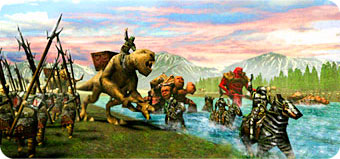 Fierce Creatures. Bring a horde of powerful monsters into battle. |
 “Most of the characters, places and events in the game are based on historical reality, and we found out that reality really is stranger than fiction. For instance, the main bad guy in the game, the Patriarch, is corrupt and tainted with Paganism, and he performs a pagan ritual in the Patriarchal Palace. Well, in fact, a pope did the same thing in the Papal Palace in Rome in the 17th century.”
“Most of the characters, places and events in the game are based on historical reality, and we found out that reality really is stranger than fiction. For instance, the main bad guy in the game, the Patriarch, is corrupt and tainted with Paganism, and he performs a pagan ritual in the Patriarchal Palace. Well, in fact, a pope did the same thing in the Papal Palace in Rome in the 17th century.”
Like many real-time strategy (RTS) games, Feral Interactive’s Warrior Kings requires you to construct and upgrade buildings, collect resources and assemble armies. Unlike many RTS titles, though, Warrior Kings eschews the idea of selecting a race or civilization to command and instead asks you to choose a path that dictates what technology you will have at your disposal as you vie for control of the world known as Orbis.
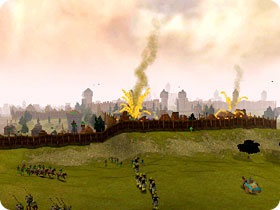
When the Walls Came Tumbling Down. Send your army to engage the enemy.
Control Your Destiny
Warrior Kings’ single-player campaign consists of 22 levels that place you in control of the House of Cravant, a province within the Empire of the One God. The Empire is ruled by two leaders, the Holy Protector, who controls the military, and the Supreme Patriarch, who oversees religion. A new Patriarch named Ichthyus Granitas has used deception to take control of the Empire, however, and the people soon look to the Baron of Cravant, Amalric, and his son, Artos, for assistance.
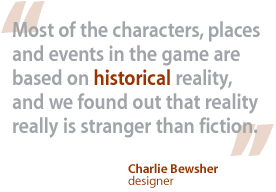
Your goal is to guide the House of Cravant as it tries to take control of the Empire back from Ichthyus Granitas. At certain points in the game, you are offered a choice of paths. If you play again and make alternate decisions, you get to play different quests for a varied experience.
Bewsher notes that the development team drew on the history of the Church in medieval Europe to create the three paths: Imperial (religious rule), Paganism (nature magic) and Renaissance (technology above all else). Despite the Patriarch’s ties to Paganism, that option (as well as the others) is neither inherently good nor evil; it simply grants you access to certain options while closing off others.
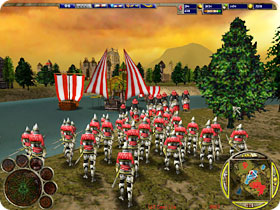
Assemble the Troops. You can use ships to ferry your armies to distant lands.
“The Pagans can summon demons,” Bewsher explains, “but they are also free and at one with nature. The Imperials can call down the righteous wrath of God, but they are cruel and intolerant. Renaissance forces are great economists and scientists, but they use their knowledge to make weapons of war, and nature become something to be consumed rather than nurtured.”
 He adds that your approach to RTS games will likely help guide your decisions. “Defensive RTS players will choose the Imperials: they can sit behind large walls and hurl Acts of God at their enemies,” he says. “The more direct player — known as ‘the rusher’ — may well go Pagan as they have access to the most brutal and numerous military units. Technocrats who see RTS games as economic games will choose Renaissance, who boast the best economy and most powerful siege units but whose soldiers are generally poor.”
He adds that your approach to RTS games will likely help guide your decisions. “Defensive RTS players will choose the Imperials: they can sit behind large walls and hurl Acts of God at their enemies,” he says. “The more direct player — known as ‘the rusher’ — may well go Pagan as they have access to the most brutal and numerous military units. Technocrats who see RTS games as economic games will choose Renaissance, who boast the best economy and most powerful siege units but whose soldiers are generally poor.”
3D Makes a Difference
No matter which path you choose, you’ll eventually have to command your forces in battle, deciding what formations to use and how best to deploy them. There are two basic types of armed forces — infantry and cavalry — each of which is either heavy or light, depending on their specialization.
|
|
|||||
|
|
|
|
|||
|
|
|||||
| Warrior Kings Media | |||||||
|
|||||||
|
|
|||||||
|
|
|
|
|||||
|
|
|||||||
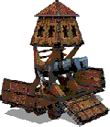 The technology at their disposal, as well as the depth of their training and their prior experience in battle, will also factor into your war-time decisions. And don’t forget that you can build siege weapons, summon magical beasts, as well as pull other tricks out of your helmet as you prepare for war.
The technology at their disposal, as well as the depth of their training and their prior experience in battle, will also factor into your war-time decisions. And don’t forget that you can build siege weapons, summon magical beasts, as well as pull other tricks out of your helmet as you prepare for war.
In addition, Warrior Kings’ 3D environment allows you to take the landscape into account and use it to your advantage as you move your troops into position to take on the enemy. For example, archers placed on a hill can devastate a battalion marching below them, even if they’re outnumbered by the enemy.
Bewsher notes that the move away from an isometric 2D point-of-view also enhances the aesthetics of a title like Warrior Kings, thanks to the ability to not only survey the landscape from a bird’s-eye-view but to also zoom in on your troops and follow them from ground level.
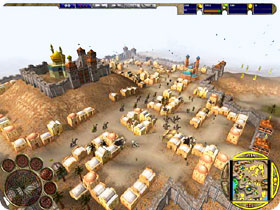
Medieval Sim City. Build your city and watch it flourish.
“It’s far more immersive being with your cavalry as they trot through a forest or seeing them silhouetted on a craggy skyline,” he says.
Eight Can Play at That Game
If multi-player mode appeals to you more, Warrior Kings offers built-in GameRanger support that pits you against players from all over the world. Up to eight gamers can do battle at once. If you want to host a game, you can decide whether destroying everyone else’s manors (home bases) or all their armed forces determines victory as well as each player’s starting resources and what type of map you will play on.
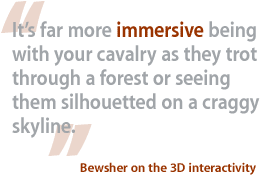
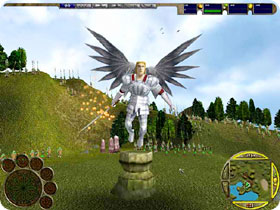
Winged Warrior. A host of fascinating characters will be awaiting you.
Like the single-player game, multi-player action allows you to choose one of three paths but throws in two more: Imperial-Renaissance (described in the manual as “bishops with gunpowder”) and Pagan-Renaissance (“demons and war machines”). Multi-player games also allow you to forge alliances with other players and send supplies (known as tributes) to them.
And don’t assume that medieval European history should be your only guide when planning combat, as Bewsher notes when he relates his favorite strategy for multi-player success: “I tend to follow the Sun Tzu maxim of being strong where your enemy thinks you are weak; that is, I use hidden bases and large-scale flanking maneuvers.”
If you liked this game, check out:
|
|
|||
|
|
|
|
|
|
|
|||
Do you have comments for this game article? Send us a note.
